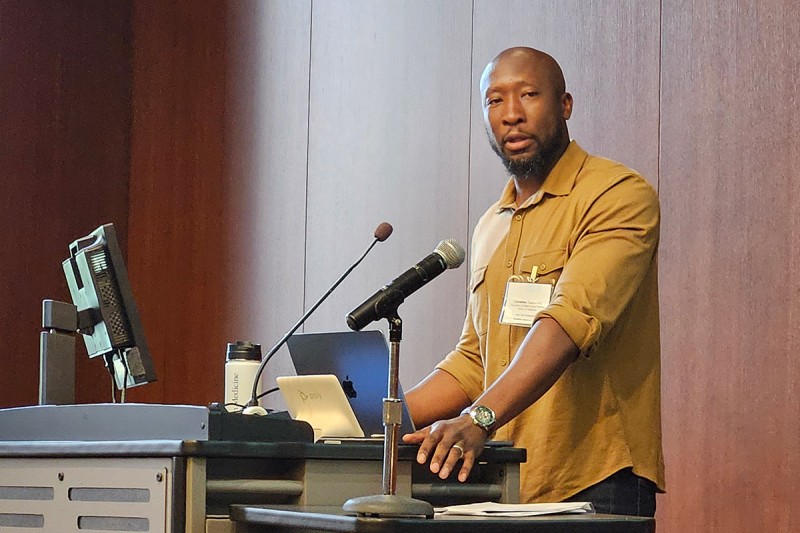
Cornelius Taabazuing, PhD, cuts right to the chase when asked what advice he would give someone considering whether to join Memorial Sloan Kettering Cancer Center (MSK) as a postdoctoral researcher.
“It’s a no-brainer,” he says with a laugh. “You work with brilliant people, including interacting with researchers at Weill Cornell Medicine and the Rockefeller University. It’s a world-class environment for science. If you have the opportunity, don’t even think about it. Just do it.”
Dr. Taabazuing credits his five years as a postdoctoral researcher at MSK’s Sloan Kettering Institute with helping him take the next step in his blossoming career. He is now a Presidential Assistant Professor in the Department of Biochemistry and Biophysics at the University of Pennsylvania, where his academic appointment is based in the Perelman School of Medicine.
Understanding Cell Death
In the lab he leads, Dr. Taabazuing and his team conduct research on two fronts: a translational project focused on oncology and basic science.
“In the simplest terms, our translational research focuses on two forms of cell death, pyroptosis and apoptosis,” he says. “The type of cell death that we’re inducing wakes up your immune system. So there’s potential to kill cancer cells in a way that also activates an immune response.”
He continues, “We also conduct basic science that is focused solely on understanding the mechanism of activation in response to a particular pathogen.” A key area of that research includes investigating different proteins and the machinery involved in activating them.
Dr. Taabazuing’s lab is particularly interested in proteases. “Think of them as molecular scissors,” he explains. “They exist to cut things inside the cell, which regulates different biological processes.” As a result, he says, “we want to understand the mechanism of how they are activated and what biology they regulate.” His lab has already published two papers on related topics, and he looks forward to more publications soon.
Lessons From MSK
Dr. Taabazuing began studying pyroptosis in 2015 in the lab of Daniel Bachovchin, PhD, the Geoffrey Beene Junior Faculty Chair. “I really enjoyed the research I did with Dan, especially about the innate immune signaling pathways,” says Dr. Taabazuing. “I learned a lot in Dan’s lab. For instance, I was already a good writer. But I definitely improved in how to write a grant, which is a crucial skill.”
Dr. Taabazuing also gained a deep grounding in the innate immune system. “I wasn’t really a cell biologist when I started,” he says. “I was interested in cancer biology, and in Dan’s lab I learned how to work with cells, do genome editing, and really learn chemical biology, which is basically using chemical tools to study biological processes.”
Dr. Taabazuing was also impressed with the collegial, family-like atmosphere he found in the lab.
“Dan was an incredibly supportive mentor,” he says. “He is one of the most creative scientists that I’ve had the pleasure of interacting with. He’s invested in the success of his mentees, and he provides good, honest feedback.”
From Ghana to UMass to MSK
Dr. Taabazuing’s journey began in a village in Ghana, where he was born and lived until he was 9. His family then moved to the United States, and he grew up in the Boston area. In high school he discovered his love of science. “I’ll never forget in honors biology when we learned about neurotransmission — how nerve cells use chemicals to communicate across synapses. I found it fascinating.”
He attended the University of Massachusetts, Amherst, for both undergrad and graduate school. After college, he worked at the University of Colorado in the lab of Thomas Cech, PhD, who shared a Nobel Prize in Chemistry for the discovery of the catalytic properties of RNA — meaning that RNA could cut strands of itself.
When he came to MSK, Dr. Taabazuing was very impressed with the MSK Postdoctoral Association. “I think MSK has the best postdoc association out of all the New York schools,” he says. “I was heavily involved in a lot of activities with the PDA.”
Those activities included everything from participating in Cuban salsa dance lessons to teaching New York City middle and high school students about cancer biology and scientific career possibilities. “That was so rewarding,” he recalls, “and really fun.”
He also used the PDA as a platform to effect change. “I’m somewhat of an activist,” he says. “After the killing of George Floyd, we had negotiations with hospital leadership, and among the things we pushed for was different pipelines to help transition people into science who have historically been excluded.”
Dr. Taabazuing says those discussions contributed to the creation of the MSK Bridge Program, which aims to connect promising college grads from traditionally underrepresented groups with future careers in biomedicine. “They should be surrounded by the best and learn from the best, which is MSK,” he explains. “I think eventually that will diversify the scientific workforce and lead to better innovation and better work.”
“We’re Thriving”
Today, Dr. Taabazuing reports that his lab at UPenn has a great team and is thriving, and so is his family. He and his wife have two sons, including a 1-year-old. “I love raising them and making sure they’re curious,” he says.
As he looks back, “MSK really set me up for success,” he says. “It was such a great lab, and such a great environment to learn in. MSK was fantastic.”